Qipao, is the representative of Chinese women now. It reveals the allure of oriental subtlety. Qipao is a dressing choice of Chinese women in important events. In the Western, many ladies also try to wear Qipao. Designers try to add the element of Qipao to their design. First Lady of different may also wear Qipao in the meeting with Chinese Leaders. Qipao is not only fashion, but also culture and arts.
旗袍,是今天中國女性的象徵,高貴而具有美感,展現女性優美的曲線,優雅而不下流,處處透視東方女性含蓄的性感。今天,旗袍已成為中國禮服的一種,亦是中國女性在重要場合的禮服選擇,在興起中國熱的西方,不少異國女性也愛穿上旗袍,各國設計師亦曾將旗袍元素加入流行服裝,各國元首夫人與中國交流時亦愛穿著旗袍,旗袍已超越時裝,成為中國文化的代表之一。
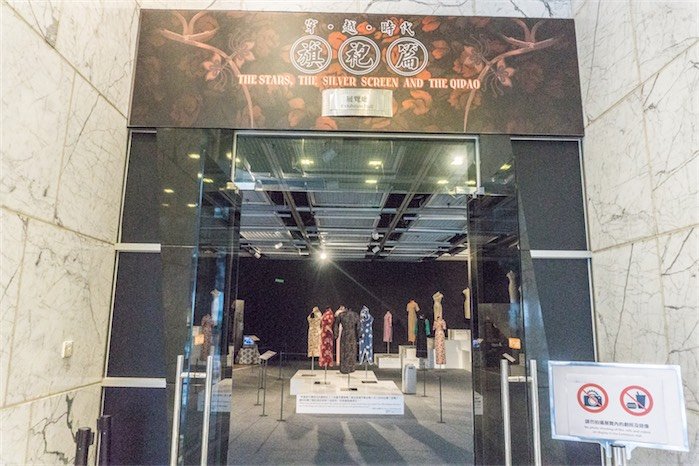
At the Hong Kong Film Achieve, there is the exhibition “The Stars, The Silver Screen and the Qipao”. It displays the qipao from HK films made between the 1940s to 2000s which bring you on a cultural journey through time, allowing you to once again admire the charm of qipao-wearing.
在香港電影資料館,正好有一個《穿・越・時代 旗袍篇》的展覽,展示香港在1940-2000年間數部經典電影中女主角曾穿著的旗袍戲服,重現那個時代的人文風景,讓大家欣賞當年旗袍風姿,同時細味那個年代,在傳統弱勢的中國女性,如何於新時代掙扎、發亮。
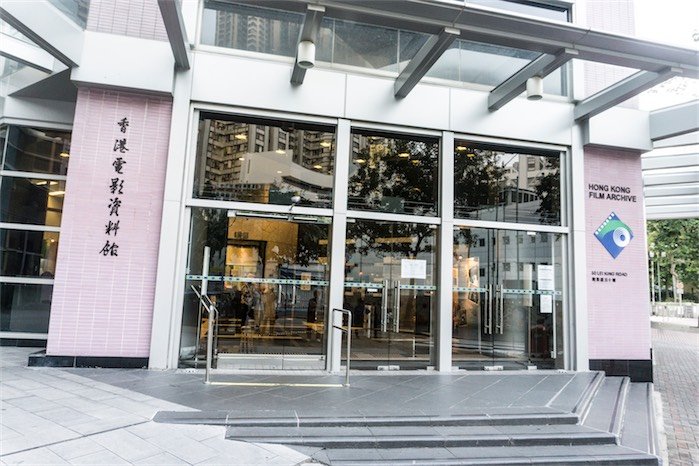
Address: 50 Lei King road, Sai Wan Ho, Hong Kong
地址:香港西灣河鯉景道50號
History of Qipao 旗袍的歷史
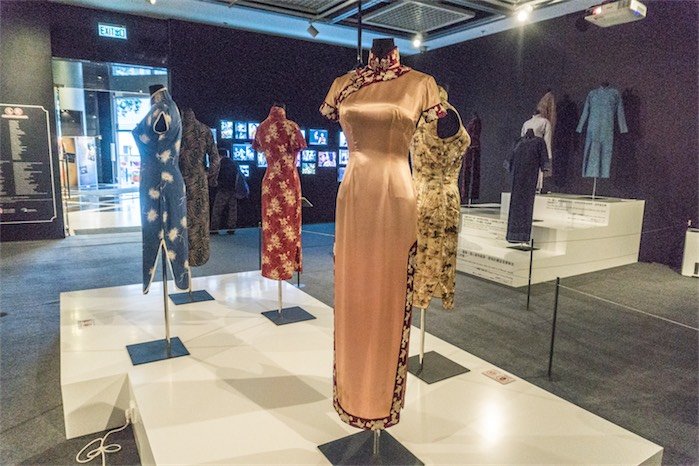
“Passion is shackles / Love is yoke / How many lovers end up a joke”
Li Xianglan as Ge Qiuxia – An Unforgettable Night” 1958
“情是枷 / 愛是鎖 / 情場有幾個好結果”
葛秋霞 李香蘭飾 - 《夜風流》 1958
Qipao is also called Cheongsam. It originally referred to the long gowns worn by Manchu women of the Qing Dynasty. It was ankle length and featured a loose, straight cut and wide sleeves. After the 1911 Revolutions, women had the chance of schooling and active participation in social affairs. The new generation of women started to promote “new civilized outfit” and amended the old Cheongsam to be more practical and allowing them to move around more easily. It gained popularity among educated women. With further amendment with western style added, Qipao became the predominant clothing style.
旗袍,又稱長衫,原指中國清朝八旗婦女的長袍,清末期間民風保守,過份講禮,長袍寬身平直,闊袖,長及掩足,行動極為不便。直到民國期間,女子受教育的機會增加,新一代的知識女性開始宣揚「文明新裝」,以一班上海女學生為首,將長袍改良成輕便簡樸,方便行動的樣式,受到都市女性的歡迎,後慢慢加入西洋服飾元素,變成今天窄身,長至腳裸,展現女性體態的旗袍。
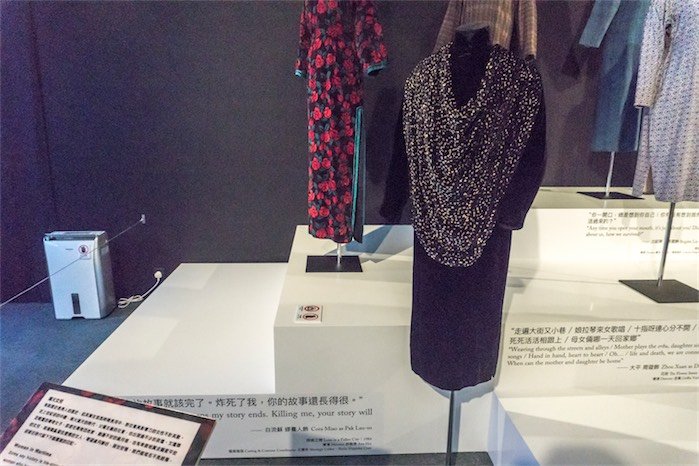
“Killing you in the expolsion means my story ends. Killing me, your story will continue for ages.”
Cora Miao as Pak Lau-so – “Love in a Fallen City” 1984
“炸死了你,我的故事就該完了。炸死了我,你的故事還長得很。”
白流蘇 繆騫人飾 - 《傾城之戀》 1984
It’s believed one of the four big females starts of Shanghai films, Gu Lanjun, was the first to pioneer the qipao’s side split in the 1930s. Her fans all followed in her footsteps. Making the side split a key feature of the dress from that point on. After the political upheaval in 1949, qipao was banned in the Mainland China. Many Shanghai tailors moved to Hong Kong, turning HK into a strong hold for the preservation of the dress. Later HK films developed rapidly. And those classic films become a memory for us to remember the beauty of Qipao.
據說,當年上海影壇「四大名旦」之一的顧蘭君,於三十年代率先把旗袍開叉,影迷爭相仿效,自此開叉就成為了旗袍的一大特色。隨時一九四九年政權更迭,旗袍遭到打壓,大批上海的裁縫避難香港,香港成為了保存旗袍的重地。其後香港電影業發達,出產多部經典電影,這些電影,成為了我們回顧當年旗袍之美的留存。
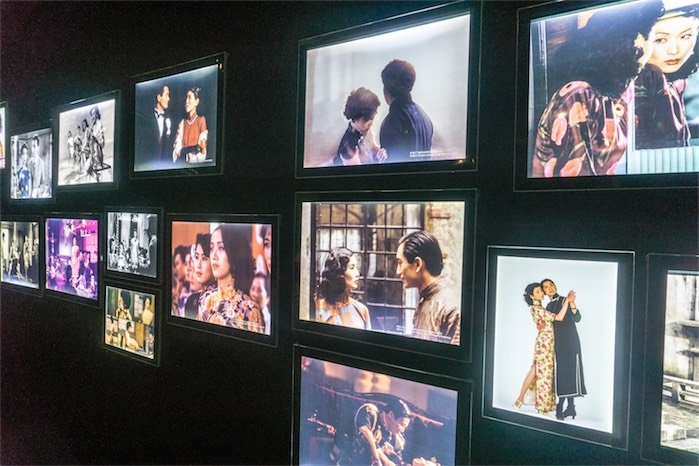
“The Stars, The Silver Screen and the Qipao” takes the women of the early 20th century as the protagonist of the exhibition. It is divided into 5 parts. While displaying the beauty of Qipao, it also tell us the living of new age women in the 20th century,
《穿・越・時代 旗袍篇》以民初新時代女性為主角,分成五個部份,在展示旗袍的同時,亦向我們訴說新時代女性的掙扎之路。
Souls in the Shadows 活在暗角的靈魂
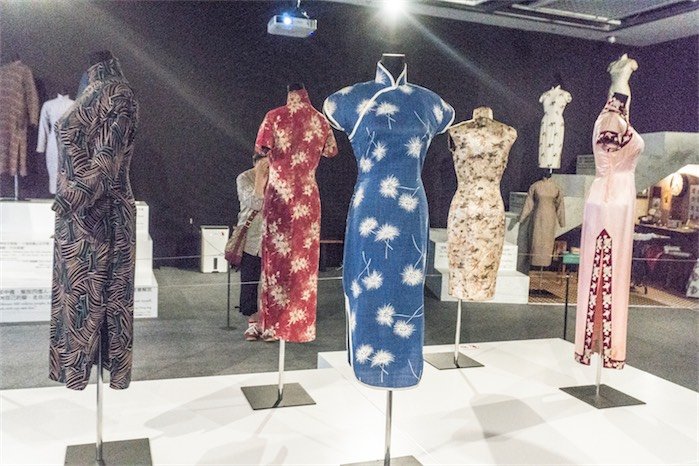
“Now I’m big, there are wealthy people willing to pay for me, letting me enjoy life. Am I degrading myself just because of this?”
Hsia Moon as Chen Bailu – “Sunrise” 1956
“現在我紅了,那些有錢的人願意養我,讓我享受。難道這樣就是我自甘墮落嗎?”
陳白露 夏夢飾 - 《日出》 1956
No matter when and where, even in broad daylight, there are always those inhabiting the dark corners of the city. They cannot live in the light, and are despised by the rest of the world. Some may flitter about in high society, dressed in beautiful clothes and savoring delicacies; yet despite the glamour on the outside, they often carry bleeding wounds on the inside. They are all labelled as wicked women.
在男尊女卑的時代,總有一些人被稱為壞女人,存活在都市暗角。她們見不得光,為社會所蔑視。在新時代,為了生活,為了生存,她們有些穿梭於上流社會交際場所,每天華衣美服百味珍鱔,然而表面風光,內裡其實是一道道淌血的傷口。
Modern Girls 新時代時尚女郎
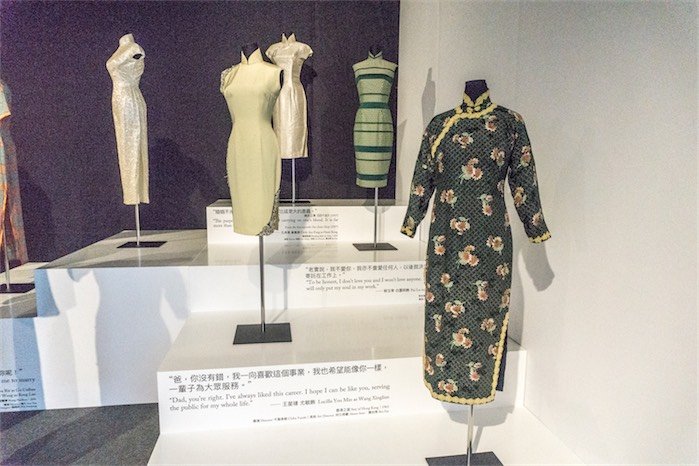
“I swear I will leave here one day!”
Linda Lin Dai as Mei Jie – “The Orphan Girl” 1956
“總有一天,我會離開這裡的!”
梅潔 林黛飾 – 《梅姑》1956
After the war, when cities were still in shambles but life was relatively stable, the chances of females receiving education greatly improved, resulting in a surge in young women joining the ranks of the social elite, shining brightly in all sectors and industries, with their successes on par with me., They were educated, confident and independent in thought and finances. Many spoke foreign languages, loved to travel, were interested in all things new and held a totally different view on love and marriage, Inside and out, these were one-hundred percent modern girls.
戰後百廢待興,但生活相對安穩,縱然仍是男尊女卑,但不少新時代女性憑著努力,憑著教育,成為新一代的社會菁英,在各行各業發光發亮,成就甚至媲美男性。她們有學識、有自信,思想、經濟獨立,部份更通曉外語,喜歡周遊列國,對新事物有所認知,對愛與婚姻也別有見解,無論內在與外表,都是不折不扣的時尚女郎。
Stars on the Stage 女伶女星
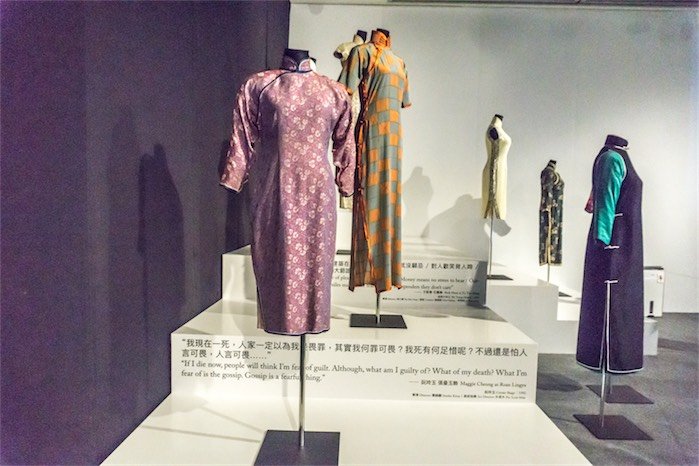
“let me now change the tune for you all. I’ll bring you a modern song, whether I sing it well or not, hope you all excuse me!”
Zhou Xuan as Daping – “The Flower Street” 1950
“現在換我來,給您諸位換換耳音,侍候您一段時代歌曲。唱得好與不好,請諸位多多原諒。”
大平 周璇飾 - 《花街》 1950
in feudal times, women were confined to their homes, and men did not want their women showing their faces in public, Later, when society gradually opened up, people slowly began accepting female performers in the entertainment industry. Talented women would grace the stage or the silver screen, not just to make a living but to do what they love, and what they were good at, stealing attention and winning praises. But becoming a household name left them with little privacy and fewer freedoms in life. With people making an unholy sport out of gossiping, living a life of normality became ever more difficult, sometimes even ending in tragedies.
離開封建時代,女性不需再三步不出閨門,她們亦能拋頭露面,在社會闖出一片天。在表演行業,一個又一個才藝女性走上舞台或水銀燈下,除了討生活外,還可發揮所愛所長,並且贏得觀眾的欣常和讚美。然而,很到大眾的注目,表示再難有隱私,生活也就不得自由自主,蜚短流長,要過尋常小日子再不輕易。
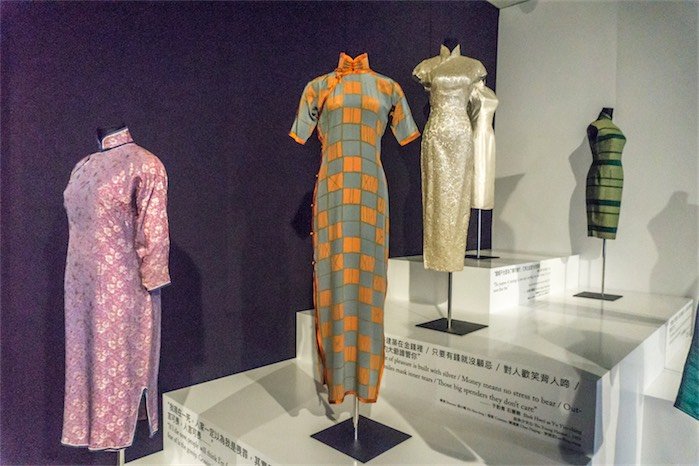
“If I die now, people will think I’m fear of guilt. Although, what I guilty of? What of my death? What I’m fear of is the gossip. Gossip is a fearful thing.”
Maggie Cheung as Ruan Lingyu – “Center Stage” 1992
“我現在一死,人家一定以為我是畏罪,其實我何罪可畏?我死有何足惜呢?不過還是怕人言可畏,人言可畏……”
阮玲玉 張曼玉飾 - 《阮玲玉》 1992
Wife Life 情感倒錯的妻子
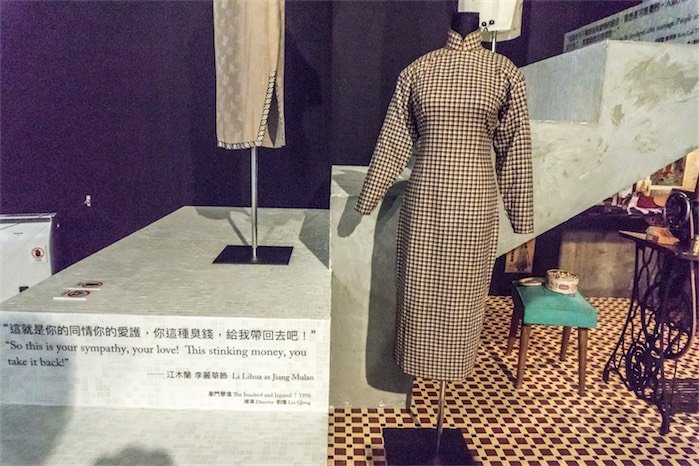
“So this is your sympathy, your love! This stinking money, you take it back!”
Li Lihua as Jiang Mulan – “The Insulted and Injured” 1950
“這就是你的同情你的愛護,你這種臭錢,給我帶回去吧!”
江木蘭 李麗華飾 - 《豪門孽債》 1950
In contemporary world marriage, part from being a contract of union between two people, also carries a certain degree of moral responsibility imposed upon them by society. Yet before polygamy was banned and the one-man-one-woman marriage system was enforced, “till death do us part” seemed to be a rule written solely for women. Even in film, whether the female protagonist falls in love by choice, is forced to marry against her will, or tragically misplaces her heart, when a marriage goes wrong, she can at most be unfaithful in thoughts. In the end, she must return to the arms of the husband. In the old world, the wife was forever bound by invisible yet unbreakable shackles.
現代社會,婚姻除了是兩個人締的契約外,還包含社會加諸已婚男女的道德責任。然而在新時代,於確立一夫一妻制之前,「從一而終」彷彿僅是為女性而設的緊箍咒。即使在電影之中,無論女主角是自由戀愛、被迫嫁人還是痴心錯付,婚姻不如意時,也只能思想越軌,最終都被安排回到丈夫身邊。在舊世界裡,做妻子的,也無從掙脫無形的枷鎖。
Women in Wartime 烽火女兒
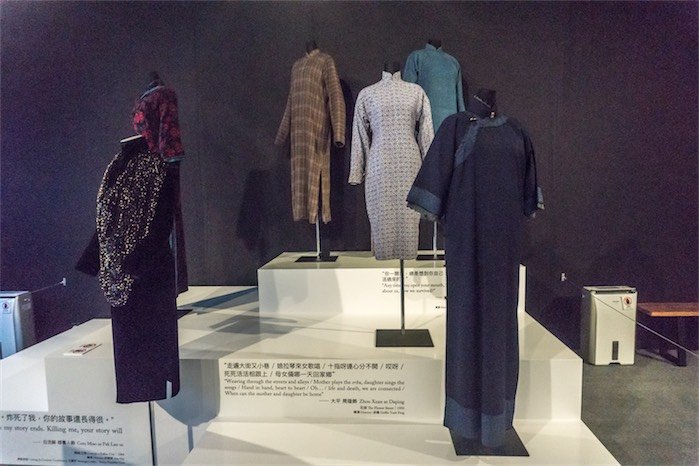
“If your dream is to liberate China, liberate 400 million people, let everyone have shoes to wear, then my wish is to liberate myself, liberate a woman, to walk my own path with my own feet.”
Maggie Cheung as Soong Ching-ling – “The Soong Sisters” 1997
“假如你的夢想,是要解放中國,解放四億人,讓每一個人都有鞋穿,那我的願望是要解放自己,解放一個女人,要用自己的腳,走自己的路。”
宋慶齡 張曼玉飾 - 《宋家皇朝》 1997
Some say history is his-story, but in the new age, the women who have made a mark in society have been countless as the stars. Early in the last century when China was ravaged by war and the society was strictly patriarchal, there was still a number of legendary world. Even whining the common man’s home during times of instability, there was always a daughter who humbly prayed for her family’s safety, or a woman who used was as an excuse to keep a man by her side, hoping for a better time amid the turbulence; their names may never go down in history but the imprint they left in time will always be there.
有說歷史是男人的歷史,但在新時代,女性開始抬頭,對社會具影響力的女性不計其數。在那個烽火連天的時代,父權主義的社會,出現了不少於政壇、文壇舉足輕重的傳奇女子。即使在尋常百姓家,動盪不安的歲月裡,也有卑微地冀求閤家平安的女兒,或借戰亂留住愛情的女人,寄望歲月靜好,現世安穩。她們縱或名不見經傳,卻都在時代留下不能磨滅的印記。
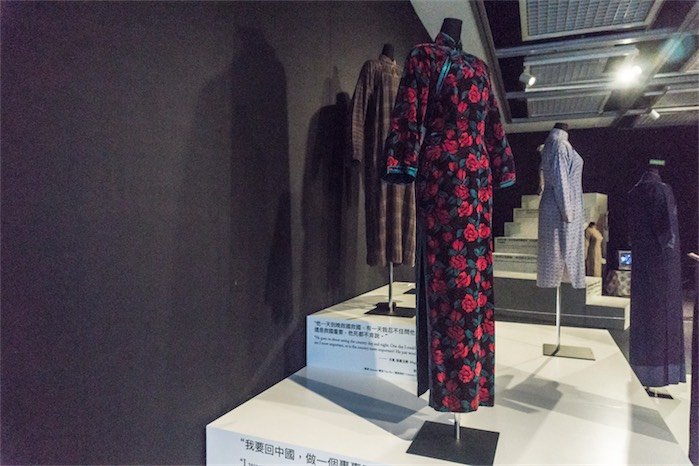
“I want to go back to China, and be a woman of fire!”
Anita Mui as Kawashima Yoshiko – “Kawashima Yoshiko” 1990
“我要回中國,做一個轟轟烈烈的女人!”- 《川島芳子》 1990
I would like to say the exhibition is not display the Qipaos, but by the media of Qipaos, show us the great old HK films, as well as how the Chinese women stepped out from the feudal times and faced the new world. I strongly recommend the exhibition to all of you.
這個展覽與其說是展示旗袍,倒不如說是借助旗袍這個媒介,讓我們重溫當年的香港電影,當年的中國女性如何走出封建,步向世界,我誠意向大家推介這個展覽。
!steemitworldmap 22.285085 lat 114.219838 long d3scr
謝謝你能抽空閱讀這篇文章,我平日喜歡分享香港的故事,希望大家多多支持,我會繼續努力!
Thanks for spending your time to read my articles. I like to share stories of Hong Kong. I wish you may support me and I will keep going!

